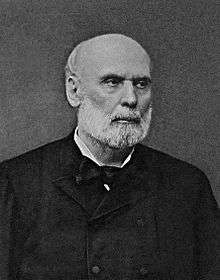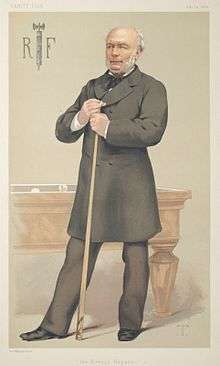Jules Grévy
| Jules Grévy | |
|---|---|
 | |
| 4th President of France | |
|
In office 30 January 1879 – 2 December 1887 | |
| Prime Minister |
Jules Armand Dufaure William Henry Waddington Charles de Freycinet Jules Ferry Léon Gambetta Charles de Freycinet Charles Duclerc Armand Fallières Jules Ferry Henri Brisson Charles de Freycinet René Goblet Maurice Rouvier |
| Preceded by | Patrice de MacMahon |
| Succeeded by | Marie François Sadi Carnot |
| Co-Prince of Andorra | |
|
In office 30 January 1879 – 2 December 1887 | |
| Served with | Salvador Casañas y Pagés |
| Preceded by | Patrice de MacMahon |
| Succeeded by | Marie François Sadi Carnot |
| Personal details | |
| Born |
15 August 1807 Mont-sous-Vaudrey, France |
| Died |
9 September 1891 (aged 84) Mont-sous-Vaudrey, France |
| Political party | Opportunist Republican |
François Paul Jules Grévy (French pronunciation: [ʒyl ɡʁevi]; 15 August 1807 – 9 September 1891) was a President of the French Third Republic and one of the leaders of the Opportunist Republicans faction. Given that his predecessors were monarchists who tried without success to restore the French monarchy, Grévy is seen as the first real republican President of France.
Biography
Born at Mont-sous-Vaudrey in the Jura Mountains, he became an advocate in 1837, and, having steadily maintained republican principles under the Orléans monarchy, was elected by his native department to the Constituent Assembly of 1848. Foreseeing that Louis Bonaparte would be elected president by the people, he proposed to vest the chief authority in a president of the Council elected and removable by the Assembly, or in other words, to suppress the Presidency of the Republic. After the coup d'état this proposition gained Grévy a reputation for sagacity, and upon his return to public life in 1868 he took a prominent place in the Republican party.


Initiated at "La Constante Amitié" in Arras,[1] his Masonic activity is inseparable from his political action,[2] specially in the struggle for separation of Church and State that marked the beginning of the Third Republic and MacMahon resignation.
After the fall of the Empire he was chosen president of the Assembly on 16 February 1871, and occupied this position until 2 April 1873, when he resigned on account of the opposition of the Right, which blamed him for having called one of its members to order in the session of the previous day. On 8 March 1876 he was elected president of the Chamber of Deputies, a post which he filled with such efficiency that upon the resignation of Marshal MacMahon he seemed to step naturally into the Presidency of the Republic (30 January 1879), and was elected without opposition by the republican parties.
Resignation
Quiet, shrewd, attentive to the public interest and his own, but without any particular distinction, he would have left an unblemished reputation if he had not unfortunately accepted a second term (18 December 1885). Shortly afterwards, his son-in-law, Daniel Wilson, was found to be trafficking in the awards of the Legion of Honour. Grévy was not accused of personal participation in these scandals, but he was somewhat obstinate in refusing to realize that he was indirectly responsible for the misuse his relative had made of access to the Elysée, and it had to be unpleasantly impressed upon him that his resignation was inevitable (2 December 1887).[3] This political matter was the first one to feed the anti-masonic opinion in France.[4]
He died at Mont-sous-Vaudrey on 9 September 1891.
In private life, Grévy was an ardent billiards player, and was featured in a portrait as a player in Vanity Fair magazine in 1879.
Grévy's zebra, a species of zebra, is named after him.
See also
References and notes
Discours politiques et judiciaires, rapports et messages accompagnes de notices historiques et l'ricédis d'une introduction par L. Delabrousse (2 vols., 1888)
 This article incorporates text from a publication now in the public domain: Chisholm, Hugh, ed. (1911). "article name needed". Encyclopædia Britannica (11th ed.). Cambridge University Press.
This article incorporates text from a publication now in the public domain: Chisholm, Hugh, ed. (1911). "article name needed". Encyclopædia Britannica (11th ed.). Cambridge University Press.
- ↑ Dictionnaire de la Franc-Maçonnerie (Daniel Ligou, Presses Universitaires de France, 2006)
- ↑ Dictionnaire universelle de la Franc-Maçonnerie (Marc de Jode, Monique Cara and Jean-Marc Cara, ed. Larousse , 2011)
- ↑ Rochefort, Henri. "The Adventures of My Life, vol. 2" pp315-318
- ↑ Dictionnaire universelle de la Franc-Maçonnerie (Marc de Jode, Monique Cara and Jean-Marc Cara, ed. Larousse , 2011)
| Political offices | ||
|---|---|---|
| Preceded by Patrice de MacMahon |
President of France 1879–1887 |
Succeeded by Sadi Carnot |
| Preceded by Patrice de MacMahon |
Co-Prince of Andorra 1879–1887 |
Succeeded by Sadi Carnot |